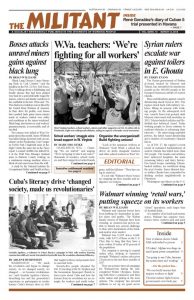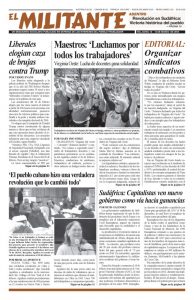HAVANA — One of the events that drew the most interest at this year’s Havana International Book Fair was the presentation of a book by René González, one of the five Cuban revolutionaries who spent up to 16 years in U.S. prisons, framed up for their actions in defense of the Cuban Revolution.
He was introducing Escrito desde el banquillo: El diario de René (Written from the dock: René’s diary), the journal González kept during their seven-month-long trial in a U.S. federal court in Miami. It was published in three volumes by Editora Capitán San Luis, publishing house of Cuba’s Ministry of Interior.
Joining González at the Feb. 9 book presentation was Ricardo Alarcón, former president of Cuba’s National Assembly, who was a prominent voice in the Cuban government’s tireless efforts to win the release of the Five.
Some 200 people attended the book launch, including many who were involved in the campaign for the release of Gerardo Hernández, Antonio Guerrero, Ramón Labañino, Fernando González, and René González — the Five Heroes, as they are known here. In the front row were Hernández, Guerrero, and numerous family members of the Five, including Olga Salanueva, René’s wife.
While living in south Florida during the 1990s, the five gathered information for the Cuban government on the actions and plans of counterrevolutionary Cuban American groups with a long history of bombings and other murderous attacks in Cuba, the U.S., and elsewhere in the Americas.
Arrested by the FBI in September 1998, they were initially locked up for 17 months in the “hole” at Miami’s Federal Detention Center in an unsuccessful effort to break them. González’s diary spans the period from November 2000, when their trial began, to March 2002 when the five were shipped off to different prisons across the United States to begin serving their sentences.
Dignity and confidence
González’s day-by-day account details how the five revolutionaries conducted themselves with dignity and confidence in face of brutal prison conditions and the government’s frame-up operation in the courtroom. It paints a vivid picture of the capitalist “justice” system that millions of working people in the United States are familiar with from personal experience.
René’s diary contains dozens of pages of related photos and illustrations. They include prison paintings by Guerrero and cartoons — many published for the first time — that Hernández drew during the trial, skewering with humor the pretenses of the U.S. judge and prosecutors that they were conducting a “fair trial.”
Hernández, Labañino, and Guerrero were sentenced to life without parole on charges of “conspiracy to commit espionage,” and Hernández was given an additional life sentence for “conspiracy to commit murder.” Fernando González and René González were sentenced to 19 years and 15 years, respectively.
At the book fair presentation, Alarcón paid homage to the courage and integrity of each of the Five. He noted that René could have pled guilty to the charge against him: acting as an unregistered agent of the Cuban government. But he refused to do so and “decided to go to trial in solidarity with his four brothers.”
González explained that immigration cops arrested his wife Olga Salanueva, then living in Miami, in an attempt to pressure him to testify against the other four. Prosecutors asked him to plead guilty in exchange for a lesser sentence and warned that if he didn’t, his wife would be deported. They handed him a plea-bargain form.
“I took the form,” González said. “Then I asked Gerardo, who was the artist in our group of five, to paint a middle finger in the blank space where my signature was supposed to go, and I returned the form.”
On the eve of the trial Salanueva was deported to Cuba. “I kept a diary so that my wife, my family, and the Cuban people would know what was happening in the trial,” González said. His first entry began, “November 21, 2000. My love, Today I’m starting the longest letter I’ve written or will ever write.” The last entry was written 16 months later.
Just before U.S. authorities carried out their threat and deported Salanueva, “my lawyer went to see Olga to see how she was doing. He told me, ‘Your wife says: if they didn’t break you before, she expects nothing less of you now.’”
González told the audience that Written from the Dock will “help the reader get a clear idea about who we were dealing with in this case” — the U.S. imperialist rulers. The enemy facing the Cuban Revolution “is the same enemy as 50 years ago. They might change their methods, but the system is the same.
“We’re not dealing with Obama or Trump, or Kennedy or Nixon. We’re dealing with an empire. It has sought to swallow us up for more than 200 years. And it will continue trying to do so.”
Even more importantly, the book is about the caliber of the leadership of Cuba’s socialist revolution and the men and women who have been transformed by it.
“The five of us did what we had to do,” González said. “But let’s be clear — if we hadn’t been children of the Cuban Revolution, we wouldn’t have been the Five.”

